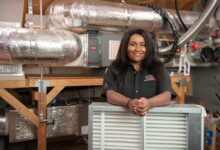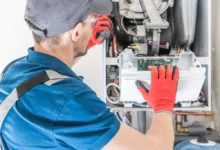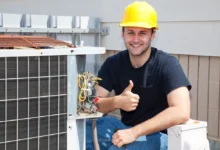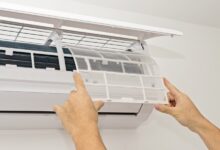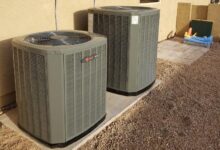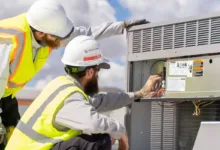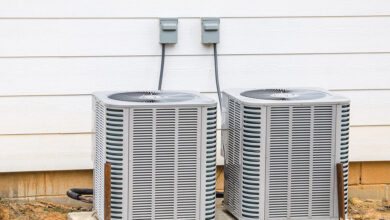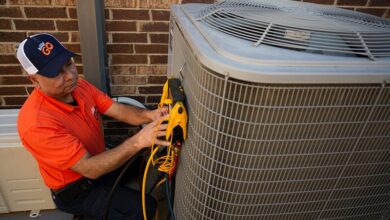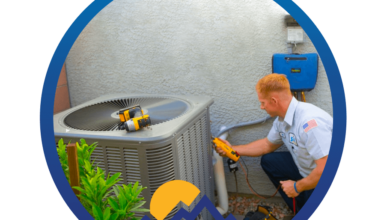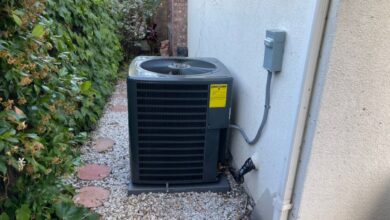HVAC Repair Albuquerque: Expert Tips for HVAC Maintenance & Services
HVAC Repair Albuquerque – Welcome to our comprehensive guide on HVAC repair in Albuquerque! Whether you are a homeowner or a business owner, maintaining a well-functioning heating, ventilation, and air conditioning (HVAC) system is crucial for your comfort and energy efficiency. In this article, we will delve into the key aspects of HVAC repair and maintenance, providing you with valuable insights and expert tips to ensure your system operates at its best.
From diagnosing common HVAC issues to understanding when to seek professional help, we will cover everything you need to know. So, let’s dive in and explore the world of HVAC repair in Albuquerque!
Understanding the Basics of HVAC Systems
When it comes to HVAC systems, having a basic understanding of how they work can help you identify and address issues more effectively. HVAC systems consist of various components, including the furnace, air conditioner, ductwork, vents, and thermostat. Each component plays a crucial role in regulating temperature, airflow, and indoor air quality in your home or commercial space.
The Role of the Furnace
The furnace is the heart of your HVAC system, responsible for heating your home during the colder months. It uses a fuel source, such as natural gas or oil, to generate heat. The heat is then distributed throughout your home via ductwork and vents.
The Function of the Air Conditioner
On the other hand, the air conditioner is responsible for cooling your indoor environment during the warmer months. It works by extracting heat from the indoor air and transferring it outside, leaving you with cool, refreshing air inside.
The Importance of Ductwork and Vents
Ductwork and vents play a crucial role in distributing conditioned air throughout your home or building. Properly designed and maintained ductwork ensures efficient airflow and consistent temperature in every room. Vents, also known as registers or grilles, allow air to enter or exit rooms, controlling the airflow and maintaining comfort.
The Role of the Thermostat
The thermostat acts as the control center of your HVAC system. It allows you to set and adjust the desired temperature in your home or building. Modern thermostats often come with programmable features, enabling you to schedule temperature changes based on your daily routine, saving energy and optimizing comfort.
Understanding the basics of HVAC systems helps you grasp how different components work together seamlessly to provide a comfortable indoor environment. Now that we have covered the fundamentals, let’s explore some common HVAC problems and troubleshooting techniques.
Common HVAC Problems and Troubleshooting
Even with regular maintenance, HVAC systems can experience issues from time to time. Identifying and troubleshooting these problems can save you time, money, and frustration. Let’s take a look at some common HVAC problems and how you can address them.
Poor Airflow
If you notice weak or uneven airflow from your vents, there may be a blockage or restriction in the system. Start by checking the air filter. A clogged or dirty filter can restrict airflow and reduce system efficiency. Replace the filter if it appears dirty. Additionally, check for any obstructions in the vents or registers and ensure they are fully open.
Odd Noises
Unusual noises coming from your HVAC system can indicate underlying issues. If you hear rattling, banging, or squealing sounds, it could be a sign of loose or worn-out components. Check the blower motor, fan, and other moving parts for any visible damage. Tighten loose screws or bolts and lubricate moving parts if necessary. If the noise persists, it’s best to consult a professional HVAC technician.
Temperature Inconsistencies
Are some rooms in your home significantly warmer or cooler than others? Temperature inconsistencies can be caused by various factors, including poor insulation, improper ductwork design, or a malfunctioning thermostat. Check for drafts around windows and doors, seal any air leaks, and consider adding insulation to improve temperature regulation. If the issue persists, consult an HVAC professional to assess your ductwork or thermostat.
System Cycling On and Off Frequently
If your HVAC system constantly turns on and off, known as short cycling, it can lead to increased energy consumption and wear on the system. Short cycling can be caused by a dirty air filter, refrigerant leaks, or an oversized system. Start by replacing the air filter and ensuring it is clean. If the problem persists, contact a professional HVAC technician to diagnose and resolve the issue.
Frozen Evaporator Coil
A frozen evaporator coil can prevent your air conditioner from effectively cooling your home. This issue is often caused by restricted airflow, low refrigerant levels, or a malfunctioning blower motor. Start by checking the air filter and replacing it if necessary. If the issue persists, contact an HVAC technician to inspect the refrigerant levels and assess the blower motor.
Unpleasant Odors
If you detect unpleasant odors coming from your HVAC system, it could be a sign of mold or bacterial growth. Mold can thrive in damp environments, such as condensate drain pans or ductwork. Clean the condensate drain pan regularly and consider installing UV lights to inhibit mold and bacterial growth. If the odor persists, consult an HVAC professional to inspect and clean your system thoroughly.
Thermostat Malfunctions
A malfunctioning thermostat can cause temperature inconsistencies and poor system performance. If you notice that your thermostat is unresponsive or not accurately reflecting the temperature, start by replacing the batteries. If the issue persists, recalibrate the thermostat or consider upgrading to a programmable thermostat for enhanced control and energy savings.
Remember, these troubleshooting techniques are intended for minor issues that you can handle on your own. However, it’s essential to know when to seek professional help for more complex problems or if you feel uncertain about performing any repairs. In the next section, we will emphasize the importance of regular HVAC maintenance to prevent these issues and ensure optimal system performance.
The Importance of Regular HVAC Maintenance
Regular HVAC maintenance is key to ensuring your system operates efficiently, extends its lifespan, and prevents costly repairs. By proactively addressing minor issues and performing routine upkeep, you can save money on energy bills and improve indoor air quality. Let’s explore the various aspects of HVAC maintenance and how they contribute to a well-functioning system.
Changing Air Filters
One of the simplest and most effective maintenance tasks is regularly changing your air filters. Air filters trap dust, pollen, and other airborne particles, preventing them from circulating through your home. Clogged or dirty filters can obstruct airflow, reduce system efficiency, and contribute to poor indoor air quality. Check your filters monthly and replace them every 1-3 months, or as recommended by the manufacturer.
Cleaning Condenser Coils
The condenser coils in your air conditioner are responsible for releasing heat to the outside. Over time, these coils can accumulate dirt, debris, and even vegetation, hindering the heat transfer process. Clean the condenser coils annually or as needed using a soft brush or vacuum. Ensure the power is turned off before performing any maintenance on your HVAC system.
Inspecting and Cleaning Ductwork
Inspecting and cleaning your ductwork is crucial for maintaining optimal airflow and indoor air quality. Over time, dust, pet dander, and other contaminants can accumulate in your ducts, reducing system efficiency and potentially triggering allergies or respiratory issues. Consider hiring a professional duct cleaning service every 3-5 years, or more frequently if you have pets or suffer from allergies.
Lubricating Moving Parts
To keep your HVAC system running smoothly, it’s important to lubricate moving parts regularly. Lubrication reduces friction, minimizes wear and tear, and helps extend the lifespan of components such as motors, fans, and bearings. Consult your system’s manual for specific lubrication points and use the appropriate lubricant recommended by the manufacturer.
Checking Electrical Connections
Loose or faulty electrical connections can lead to system malfunctions or even pose a fire risk. Regularly inspect electrical connections, ensuring they are tight, secure, and free from corrosion. If you notice any issues, such as frayed wires or signs of damage, contact a professional electrician to address the problem promptly.
Calibrating Thermostat Settings
Thermostat calibration is essential for accurate temperature readings and optimal system performance. Over time, thermostats can become slightly inaccurate, leading to temperature inconsistencies and energy waste. Consider calibrating your thermostat’s temperature readings or consult an HVAC technician to ensure precise temperature control.
Scheduling Professional HVAC Maintenance
While some maintenance tasks can be performed by homeowners, it’s crucial to schedule professional HVAC maintenance at least once a year. Professional technicians have the expertise, tools, and knowledge to conduct thorough inspections, detect potential issues, and optimize system performance. They can identify worn-out components, check refrigerant levels, inspect electrical connections, and perform other essential tasks to keep your HVAC system running smoothly.
Regular HVAC maintenance is a proactive approach to system care and can help you avoid costly repairs or premature system replacements. By investing in routine upkeep, you can enjoy a comfortable indoor environment while maximizing energy efficiency and peace of mind. In the next section, we will explore some HVAC repairs that you
DIY HVAC Repair: What You Can Handle
While some HVAC repairs require professional expertise, there are certain tasks that you can confidently tackle on your own. By taking a DIY approach, you can save money and gain a sense of accomplishment. However, it’s crucial to understand the limits of your skills and know when to seek professional help. Let’s explore some common DIY HVAC repairs you can handle.
Replacing Air Filters
Replacing air filters is one of the simplest and most important maintenance tasks that you can do yourself. Start by identifying the location of your air filter, typically found in the return air duct or near the furnace or air handler. Turn off the system, remove the old filter, and replace it with a new one of the same size and type. Make sure the filter fits snugly and that the arrow on the filter aligns with the airflow direction indicated on the unit.
Cleaning Condenser Coils
Cleaning the condenser coils of your air conditioner can significantly improve its efficiency. Start by turning off the power to the unit. Remove any debris, such as leaves or grass clippings, from the exterior of the unit. Then, use a soft brush or vacuum to gently clean the coils. Be careful not to bend the fins, as this can restrict airflow. If the coils are heavily soiled, consider using a coil cleaner recommended by the manufacturer and following the instructions carefully.
Clearing Clogged Drain Lines
If you notice water pooling around your indoor air handler or dripping from the unit, it may indicate a clogged drain line. Begin by turning off the system. Locate the drain line, typically a PVC pipe, and inspect it for any visible clogs or blockages. You can use a wet/dry vacuum or a pipe cleaner to remove the debris. Alternatively, you can mix equal parts vinegar and water and pour it down the drain line to help dissolve any buildup. Remember to turn the system back on once you have cleared the clog.
Resetting Tripped Breakers
If your HVAC system suddenly stops working, it may be due to a tripped circuit breaker. Start by locating your electrical panel and identifying the breaker that controls the HVAC system. If the breaker has tripped, it will be in the middle or “off” position. Flip the breaker to the “on” position and listen for the system to restart. If the breaker continues to trip, it may indicate an underlying electrical issue, and you should contact a professional electrician.
Sealing Air Leaks
Air leaks in your ductwork can lead to energy waste and reduced system efficiency. Luckily, sealing air leaks is a relatively simple DIY task. Begin by inspecting the visible sections of your ductwork, such as those in the attic or crawl spaces. Look for any gaps, loose connections, or signs of damage. Use foil tape or mastic sealant to seal the leaks, ensuring a tight and secure connection. However, keep in mind that accessing certain areas of the ductwork may require professional assistance.
Testing and Replacing Thermostat Batteries
If your thermostat is unresponsive or displaying a low battery warning, it’s time to test and replace the batteries. Start by removing the cover of your thermostat and locating the battery compartment. Take out the old batteries and test them using a battery tester or by inserting them into another device. If the batteries are low or dead, replace them with new ones of the same size and type. Ensure that the batteries are inserted correctly, following the polarity markings, and reattach the thermostat cover.
Adjusting Thermostat Settings
Correctly setting and programming your thermostat can help optimize energy efficiency and comfort. Begin by familiarizing yourself with the thermostat’s user manual to understand its features and functions. Set the desired temperature according to your comfort preferences and adjust the programming schedule to align with your daily routine. Consider using setback temperatures during periods when the space is unoccupied to save energy. Take advantage of any energy-saving features, such as temperature zoning or vacation modes, to further enhance efficiency.
Replacing HVAC Filters
In addition to air filters, your HVAC system may have other filters that require periodic replacement. These filters can include the humidifier filter, electronic air cleaner cells, or UV air purifier bulbs. Consult your system’s manual to identify these filters and their recommended replacement intervals. Follow the manufacturer’s instructions to safely remove and replace these filters, ensuring that they are properly installed and functioning correctly.
Clearing Debris Around Outdoor Unit
Regularly clearing debris from around your outdoor unit can help maintain optimal airflow and system performance. Check the area surrounding the unit for any leaves, branches, or other obstructions. Trim any nearby vegetation to ensure it does not interfere with the unit. Keep a clearance of at least two feet around the unit to allow for proper airflow. This simple maintenance task can significantly reduce the risk of system damage and prolong the lifespan of your HVAC equipment.
Performing Visual Inspections
Performing visual inspections of your HVAC system can help you identify any visible issues or signs of wear and tear. Check the exterior components, such as the outdoor unit, for any physical damage, such as bent fins or rust. Inspect the indoor unit for any leaks or unusual sounds. Take note of any abnormalities and consult a professional HVAC technician if you have concerns or if the issues persist.
While these DIY HVAC repairs are relatively straightforward, it’s important to prioritize your safety and know your limits. If you are unsure about performing any repairs or if the issue is beyond your expertise, it’s best to contact a professional HVAC technician. Attempting complex repairs without proper knowledge and experience can lead to further damage or potential hazards. Now that you are equipped with some DIY repair knowledge, let’s explore the signs that indicate the need for professional HVAC repair.
Signs That You Need Professional HVAC Repair
While many HVAC issues can be addressed through DIY repairs or regular maintenance, there are instances where it’s best to leave the job to the professionals. Recognizing the signs that indicate the need for professional HVAC repair can save you time, money, and potential safety risks. Let’s explore some common red flags that warrant professional attention.
Recurring or Persistent Issues
If you find yourself repeatedly addressing the same HVAC issue or if the problem persists despite your DIY efforts, it’s an indication that there may be an underlying problem that requires professional expertise. Professional HVAC technicians have the necessary skills and knowledge to diagnose complex problems and provide effective solutions. They can identify the root cause of recurring issues and implement long-lasting repairs.
Lack of Heating or Cooling
If your HVAC system fails to provide adequate heating or cooling, it’s a clear indication that something is amiss. This issue may be caused by various factors, such as a malfunctioning compressor, a refrigerant leak, or a faulty thermostat. Attempting to troubleshoot and repair these issues without the proper tools and expertise can further damage your system. Contact a professional HVAC technician to diagnose and resolve the problem effectively.
Unusual Sounds or Odors
If you notice strange sounds or odors coming from your HVAC system, it’s best to seek professional help. Unusual sounds, such as grinding, squealing, or banging, can indicate mechanical issues or worn-out components. Foul odors can be a sign of mold, bacteria, or electrical problems. HVAC technicians have the experience and knowledge to identify the source of these noises and odors and take appropriate action to rectify the problem.
Increased Energy Bills
If you notice a sudden spike in your energy bills without any significant changes in your usage patterns, it may indicate an inefficient HVAC system. Inefficient systems often consume more energy to achieve the desired temperature, resulting in increased utility costs. Professional HVAC technicians can assess your system’s efficiency, identify any underlying issues, and recommend repairs or upgrades to improve energy efficiency and reduce your bills.
Inadequate Airflow
If you experience reduced or inconsistent airflow from your vents, it may indicate a problem within your HVAC system. Clogged air ducts, a malfunctioning blower motor, or damaged components can all contribute to inadequate airflow. Professional HVAC technicians have the tools and expertise to diagnose and resolve these issues, ensuring optimal airflow and system performance.
Leaking or Moisture Accumulation
Leaking or excessive moisture around your HVAC system can indicate a serious problem. It may be a sign of refrigerant leaks, condensate drain issues, or malfunctioning components. These issues can lead to water damage, mold growth, and compromised indoor air quality. HVAC technicians can locate the source of the leak or moisture, repair any damaged components, and restore your system’s functionality.
Electrical or Wiring Problems
If you encounter electrical issues or suspect wiring problems within your HVAC system, it’s crucial to seek professional assistance. Electrical work requires specialized knowledge and skills to ensure safety and prevent potential hazards. Professional HVAC technicians are trained to handle electrical components and can safely diagnose and address any wiring issues, ensuring the proper functioning of your system.
System Age and Lack of Maintenance
If your HVAC system is approaching its expected lifespan or has not received regular maintenance, it’s advisable to consult a professional HVAC technician. Aging systems are more prone to breakdowns and inefficiencies, and professional evaluation can help determine if repairs or system replacement is the best course
Unusual Cycling or System Behavior
If your HVAC system is exhibiting irregular cycling, such as frequently turning on and off, or if it is behaving in an unpredictable manner, it’s a clear indication that something is not functioning correctly. This erratic behavior can be caused by issues such as faulty sensors, thermostat malfunctions, or electrical problems. Professional HVAC technicians have the expertise to diagnose and rectify these issues, ensuring your system operates reliably and efficiently.
Gas or Carbon Monoxide Leaks
If you have a gas-powered HVAC system, the presence of a gas leak can be extremely dangerous. Gas leaks can lead to fire hazards or carbon monoxide poisoning, which can have severe health consequences. If you smell gas or suspect a gas leak, evacuate your premises immediately and contact your gas company and a professional HVAC technician. They will be able to safely detect and repair any gas leaks, ensuring the safety of your home or business.
Manufacturer Warranty Considerations
If your HVAC system is still under warranty, it’s important to consult a professional HVAC technician for any repairs. Attempting self-repairs or seeking assistance from unauthorized individuals may void your warranty. Professional technicians are trained and authorized by manufacturers to perform repairs and ensure that your warranty remains valid. They have access to genuine parts and follow proper repair procedures to maintain the integrity of your system.
Remember, when it comes to HVAC repairs that are beyond your DIY capabilities or involve safety risks, it’s always best to rely on the expertise of professional HVAC technicians. They have the knowledge, experience, and specialized tools to diagnose, repair, and maintain your system effectively. In the next section, we will guide you through the process of choosing the right HVAC repair company in Albuquerque.
Choosing the Right HVAC Repair Company
When it comes to selecting an HVAC repair company in Albuquerque, it’s essential to choose a reliable and reputable provider. The quality of service you receive can significantly impact the performance and longevity of your HVAC system. Here are some factors to consider when choosing the right HVAC repair company:
Certifications and Licenses
Ensure that the HVAC repair company you choose holds the necessary certifications and licenses. Look for certifications such as North American Technician Excellence (NATE) or certifications specific to your HVAC system’s manufacturer. These certifications indicate that technicians have undergone rigorous training and have the knowledge and skills to handle repairs and maintenance effectively.
Experience and Expertise
Consider the experience and expertise of the HVAC repair company. Look for established companies with a proven track record in the industry. Experienced technicians are more likely to have encountered a wide range of HVAC issues and can quickly diagnose and resolve problems. Additionally, inquire about their expertise in handling your specific HVAC system brand or type.
Customer Reviews and References
Check online reviews and testimonials from previous customers to gauge the reputation and quality of service provided by the HVAC repair company. Positive reviews and recommendations indicate a company’s commitment to customer satisfaction and reliable repairs. Additionally, ask the company for references or testimonials from previous clients to gain further insights into their professionalism and expertise.
Pricing Transparency
Choose an HVAC repair company that provides transparent pricing and offers detailed explanations of the services included. Avoid companies that provide vague estimates or hidden costs. A reputable HVAC repair company will provide a clear breakdown of costs, ensuring you understand what you are paying for. Consider obtaining multiple quotes to compare prices and services, but remember that the lowest price does not always guarantee the best quality.
Emergency Services and Response Time
Emergencies can happen at any time, and it’s crucial to find an HVAC repair company that offers emergency services. Inquire about their response time for emergencies and availability outside regular business hours. A reliable company should be prompt in addressing urgent HVAC repairs to minimize downtime and inconvenience.
Insurance Coverage
Ensure that the HVAC repair company you choose has appropriate insurance coverage. This includes liability insurance to protect you in case of accidental damage to your property during repairs and workers’ compensation insurance to cover any injuries that may occur on your premises. Request proof of insurance before hiring an HVAC repair company to avoid any potential liabilities.
Service Contracts and Maintenance Agreements
Consider whether the HVAC repair company offers service contracts or maintenance agreements. These agreements typically include routine maintenance visits and priority service for repairs. They can help you stay on top of HVAC maintenance and ensure timely repairs, prolonging the lifespan of your system. Review the terms and conditions of these agreements to ensure they align with your needs and budget.
Availability of Parts
Ask the HVAC repair company about the availability of genuine replacement parts for your specific HVAC system. A reputable company should have access to original manufacturer parts or high-quality alternatives. Using genuine parts ensures the integrity and performance of your system, while subpar parts may lead to further issues and compromise the warranty.
Professionalism and Customer Service
Consider the level of professionalism and customer service provided by the HVAC repair company. Prompt and courteous communication, respect for your property, and a commitment to customer satisfaction are all important factors to consider. A reputable company will prioritize your needs, answer your questions, and provide clear explanations of the repair process.
By considering these factors and conducting thorough research, you can choose an HVAC repair company that meets your requirements, ensuring reliable repairs and maintenance for your system. In the next section, we will explore the benefits of addressing HVAC repairs promptly.
The Benefits of Timely HVAC Repairs
Delaying HVAC repairs can have significant consequences, both financially and in terms of comfort and safety. Addressing HVAC issues promptly offers various benefits that can improve the performance, longevity, and efficiency of your system. Let’s explore the advantages of timely HVAC repairs:
Improved Energy Efficiency
When your HVAC system is not functioning optimally, it can lead to increased energy consumption and higher utility bills. Prompt repairs can address issues such as refrigerant leaks, faulty components, or clogged filters, ensuring that your system operates efficiently. An efficiently running system not only saves you money but also reduces your environmental impact by minimizing energy waste.
Enhanced Indoor Air Quality
Issues within your HVAC system, such as mold growth, clogged filters, or leaky ductwork, can negatively impact indoor air quality. Poor indoor air quality can exacerbate allergies, asthma, and other respiratory conditions. Timely repairs and maintenance can address these issues, ensuring clean and healthy air circulation throughout your home or business. Improved indoor air quality promotes a comfortable and safe environment for occupants.
Extended System Lifespan
Regular maintenance and timely repairs can significantly extend the lifespan of your HVAC system. Ignoring minor issues can lead to further damage and premature system failure. By addressing problems promptly, you can prevent small issues from escalating into larger, costlier repairs. Investing in the care and maintenance of your HVAC system ensures that it operates at its best for years to come.
Prevention of Costly Breakdowns
HVAC breakdowns can be disruptive and costly, especially during extreme weather conditions. Timely repairs and regular maintenance help prevent unexpected system failures, reducing the risk of costly emergency repairs. By identifying and addressing potential issues early on, HVAC technicians can mitigate the risk of major breakdowns and ensure your system’s reliability when you need it most.
Optimal Comfort and Performance
A properly functioning HVAC system provides consistent comfort and temperature control. Prompt repairs and maintenance help maintain optimal performance, ensuring that your system delivers the desired heating or cooling throughout your space. This consistent comfort enhances your overall quality of life and creates a pleasant environment for occupants.
Compliance with Warranty Requirements
If your HVAC system is still under warranty, timely repairs are essential to ensure compliance with warranty requirements. Many warranties require regular maintenance and prompt repairs to remain valid. By addressing issues immediately and documenting repairs, you protect your warranty coverage and avoid potential disputes with the manufacturer.
By understanding the benefits of timely HVAC repairs, you can prioritize the maintenance and repairs of your system. Regular maintenance and addressing issues promptly not only save you money but also contribute to a comfortable, safe, and efficient indoor environment. In the next section, we will provide you with energy-saving tips to optimize HVAC efficiency.
Energy-Saving Tips for HVAC Efficiency
Maximizing energy efficiency not only reduces your environmental footprint but also helps lower your utility bills. By implementing these energy-saving tips, you can optimize the efficiency of your HVAC system and enjoy a comfortable indoor environment:
Adjust Thermostat Temperature Settings
Consider adjusting your thermostat temperature settings to save energy. During the winter, set your thermostat to a lower temperature when you’re away or asleep, and increase it when you’re active and at home. In the summer, raise the temperature when you’re away or use fans to supplement cooling. Programmable thermostats can automate these temperature adjustments, optimizing energy usage based on your schedule.
Seal Air Leaks and Insulate
Air leaks and inadequate insulation can cause energy waste and temperature inconsistencies. Seal any gaps or cracks around windows, doors, and ductwork using weatherstripping, caulk, or other appropriate sealants. Consider adding insulation to your attic, walls, and crawl spaces to minimize heat transfer. Proper insulation and sealing help maintain a comfortable indoor temperature and reduce thestrain on your HVAC system, improving overall efficiency.
Maintain Proper Ventilation
Proper ventilation is essential for maintaining good indoor air quality and reducing the workload on your HVAC system. Ensure that vents and registers are not blocked by furniture or other obstructions. Keep interior doors open to allow for better air circulation. Consider installing ceiling fans or portable fans to enhance airflow and create a cooling breeze, reducing the need for excessive air conditioning.
Use Natural Ventilation
Making use of natural ventilation can help reduce reliance on your HVAC system. Open windows and doors strategically to allow fresh air to circulate and cool your space during milder weather. Take advantage of cool evenings or early mornings to ventilate your home and reduce the need for artificial cooling. However, be mindful of outdoor air quality and security concerns when utilizing natural ventilation.
Regularly Clean and Maintain Your HVAC System
Regular cleaning and maintenance of your HVAC system are crucial for optimal efficiency. Clean or replace air filters regularly to ensure unrestricted airflow. Keep the outdoor unit free from debris, such as leaves or grass clippings, to maintain proper heat exchange. Schedule professional maintenance visits to inspect and tune up your system, ensuring that it operates at peak performance.
Utilize Window Coverings
Window coverings, such as blinds, curtains, or shades, can help regulate heat gain or loss from windows. During hot periods, close curtains or blinds on windows exposed to direct sunlight to reduce heat buildup. In colder months, open them during the day to allow sunlight to naturally warm your space, and close them at night to reduce heat loss. This simple step can significantly impact your HVAC system’s workload.
Upgrade to Energy-Efficient HVAC Equipment
If your HVAC system is outdated or inefficient, consider upgrading to energy-efficient equipment. Look for systems with high Seasonal Energy Efficiency Ratio (SEER) ratings for air conditioners and high Annual Fuel Utilization Efficiency (AFUE) ratings for furnaces. Energy-efficient systems consume less energy, reduce utility bills, and may qualify for rebates or incentives offered by energy companies or government programs.
Utilize Zoning Systems
If you have a larger space or multiple rooms with varying heating or cooling needs, consider installing zoning systems. Zoning allows you to control the temperature in different areas independently, optimizing comfort and reducing energy waste. By heating or cooling only the areas that are in use, you can save energy and improve efficiency.
Regularly Clean and Inspect Ductwork
Dirty or leaky ductwork can significantly impact HVAC efficiency. Regularly clean your ductwork to remove dust, debris, and potential allergens. Inspect for any leaks or disconnected sections and seal them with foil tape or mastic sealant. Properly sealed and clean ductwork ensures that conditioned air reaches its intended destination without any loss or wastage.
Utilize Smart Thermostats
Smart thermostats offer advanced features and automation that can optimize energy usage. These devices learn your behavior, adapt to your schedule, and make temperature adjustments accordingly. Some smart thermostats also provide energy usage reports and allow remote access, enabling you to monitor and control your HVAC system from anywhere. Take advantage of these features to save energy and increase efficiency.
Maintain a Clean Outdoor Unit
Regularly clean and maintain the outdoor unit of your HVAC system. Keep the area around the unit clear of debris, such as leaves, grass, or dirt. Trim any vegetation that may obstruct airflow or grow too close to the unit. A clean and unobstructed outdoor unit allows for proper heat dissipation, ensuring optimal performance and efficiency.
By implementing these energy-saving tips, you can optimize the efficiency of your HVAC system and reduce your environmental impact. Not only will you save on utility bills, but you will also contribute to a more sustainable future. In the next section, we will explore the latest innovations and trends in HVAC systems.
The Future of HVAC Systems: Innovations and Trends
The HVAC industry is constantly evolving, driven by technological advancements and the growing focus on energy efficiency and sustainability. Let’s explore some of the latest innovations and trends that are shaping the future of HVAC systems:
Smart HVAC Systems
Smart HVAC systems integrate advanced sensors, connectivity, and automation to optimize energy usage and provide personalized comfort. These systems can learn your preferences, adapt to your schedule, and make automatic adjustments to temperature and airflow. They offer remote access and control through mobile apps, allowing you to monitor and manage your HVAC system from anywhere. Smart HVAC systems provide convenience, energy savings, and enhanced comfort.
Variable Refrigerant Flow (VRF) Systems
VRF systems are highly efficient and flexible HVAC solutions that can simultaneously heat and cool different zones within a building. They utilize advanced refrigerant flow control technology to precisely match the heating or cooling demand of each zone. VRF systems provide individualized comfort, energy savings, and zoning capabilities, making them ideal for commercial buildings or large residential spaces with varying heating and cooling needs.
Energy Recovery Ventilation (ERV) Systems
Energy recovery ventilation systems help improve indoor air quality while minimizing energy loss. These systems use heat exchangers to transfer heat and moisture between the outgoing and incoming air streams, effectively recovering energy that would otherwise be lost. ERV systems provide fresh, filtered air while reducing the load on your HVAC system, resulting in energy savings and improved comfort.
Advanced Air Purification Technologies
As indoor air quality becomes increasingly important, HVAC systems are incorporating advanced air purification technologies. These technologies can remove allergens, bacteria, viruses, and other contaminants from the air. Some systems use ultraviolet (UV) lights to disinfect the air or incorporate filters with high-efficiency particulate air (HEPA) filtration to capture even the smallest particles. Advanced air purification technologies contribute to healthier indoor environments and improved respiratory health.
Eco-Friendly Refrigerants
As environmental concerns grow, HVAC systems are transitioning to eco-friendly refrigerants with lower global warming potential (GWP) and ozone depletion potential (ODP). Traditional refrigerants, such as R-22, are being phased out in favor of alternatives like R-410A or R-32, which have less impact on the environment. The adoption of eco-friendly refrigerants helps reduce greenhouse gas emissions and supports sustainability efforts.
Integration with Renewable Energy Sources
HVAC systems are increasingly being integrated with renewable energy sources, such as solar power or geothermal energy. Solar-powered HVAC systems utilize the sun’s energy to generate electricity, reducing reliance on the grid and lowering energy costs. Geothermal HVAC systems utilize the stable temperature of the earth to provide heating and cooling, offering high efficiency and sustainability. These integrations promote cleaner energy usage and contribute to a greener future.
Wireless and Connected Controls
Wireless and connected controls are becoming more prevalent in HVAC systems, allowing for easy integration and control of various components. These controls enable seamless communication between thermostats, sensors, zoning systems, and other HVAC equipment. Wireless and connected controls provide increased flexibility, improved system performance, and enhanced user experience.
Energy Monitoring and Analytics
Energy monitoring and analytics tools are gaining popularity in the HVAC industry. These tools enable you to track and analyze energy consumption, identify inefficiencies, and make informed decisions to optimize system performance. With real-time data and actionable insights, you can fine-tune your HVAC system, adjust settings, and implement energy-saving strategies.
These innovations and trends in the HVAC industry are shaping the future of heating, ventilation, and air conditioning systems. As technology continues to advance, we can expect even more efficient, sustainable, and intelligent HVAC solutions. By staying informed and embracing these innovations, you can make informed decisions when it comes to your HVAC system. In the final section, we will address some frequently asked questions about HVAC repair.
Frequently Asked Questions (FAQs) about HVAC Repair
Here are some frequently asked questions about HVAC repair:
1. How often should I change my HVAC air filters?
It is recommended to change your HVAC air filters every 1-3 months, depending on factors such as filter type, indoor air quality, and system usage. Regularly changing the air filters helps maintain optimal airflow and indoor air quality.
2. Can I perform HVAC repairs myself?
While some HVAC repairs can be done by homeowners, it’s important to know your limits and prioritize safety. Minor tasks such as changing air filters or cleaning condenser coils can typically be handled by homeowners, but complex repairs or those involving electrical components should be left to professional HVAC technicians.
3. How often should I schedule professional HVAC maintenance?
It is recommended to schedule professional HVAC maintenance at least once a year. This maintenance visit allows HVAC technicians to inspect, clean, and tune up your system, ensuring optimal performance, energy efficiency, and identifying potential issues before they become major problems.
4. How long does an HVAC system typically last?
The lifespan of an HVAC system depends on various factors, including the type of system, usage, maintenance, and environmental conditions. On average, a well-maintained HVAC system can last between 15 to 20 years. Regular maintenance and timely repairs canextend the lifespan of your HVAC system and ensure optimal performance.
5. How can I improve the energy efficiency of my HVAC system?
To improve the energy efficiency of your HVAC system, you can:- Regularly clean and replace air filters- Maintain proper insulation and seal air leaks- Utilize programmable thermostats and adjust temperature settings- Schedule professional maintenance to ensure optimal system performance- Upgrade to energy-efficient equipment- Utilize natural ventilation and take advantage of natural light- Implement energy-saving practices such as using ceiling fans or window coverings.
6. How can I find and fix air leaks in my ductwork?
To find and fix air leaks in your ductwork, you can:- Visually inspect the visible sections of your ductwork for any gaps, loose connections, or signs of damage.- Use a smoke pencil or incense stick near the duct joints and connections to detect any air movement.- Seal leaks using foil tape or mastic sealant, ensuring a tight and secure connection.- Consider hiring a professional HVAC technician for a thorough ductwork inspection and sealing, especially for hard-to-reach areas.
7. How can I determine if my HVAC system is the right size for my space?
Determining the proper size of your HVAC system requires a professional load calculation. This calculation takes into account factors such as the size of your space, insulation levels, number of windows, and local climate. A professional HVAC technician can perform this calculation to ensure that your system is appropriately sized for optimal comfort and energy efficiency.
8. What should I do if my HVAC system is not providing adequate heating or cooling?
If your HVAC system is not providing adequate heating or cooling, you can:- Check and replace air filters if they are dirty or clogged.- Ensure that vents and registers are open and not blocked by furniture or other obstructions.- Check the thermostat settings and ensure they are set correctly.- Inspect the outdoor unit for any debris or obstructions and clean it if necessary.- Contact a professional HVAC technician if the issue persists or if you suspect a more significant problem.
9. Can regular HVAC maintenance help prevent major breakdowns?
Yes, regular HVAC maintenance can help prevent major breakdowns. During maintenance visits, HVAC technicians can identify and address minor issues before they escalate into more significant problems. They can also perform necessary tune-ups, cleanings, and inspections to ensure that your system operates efficiently and reliably.
10. What are the benefits of hiring a professional HVAC repair company?
There are several benefits of hiring a professional HVAC repair company, including:- Expertise and knowledge in diagnosing and repairing HVAC issues.- Access to specialized tools and equipment for accurate repairs.- Assurance that repairs are done safely and according to industry standards.- Proper handling of complex repairs, such as electrical components or refrigerant leaks.- Peace of mind knowing that your HVAC system is in the hands of professionals.- Potential cost savings in the long run by preventing further damage or system failures.
These are just a few of the commonly asked questions about HVAC repair. If you have specific concerns or inquiries about your HVAC system, it is always best to consult with a professional HVAC technician who can provide personalized advice and guidance.
In conclusion, understanding the basics of HVAC systems, troubleshooting common problems, and prioritizing timely repairs and maintenance are essential for keeping your HVAC system functioning optimally. Regularly changing air filters, cleaning condenser coils, and sealing air leaks are some of the DIY tasks you can handle. However, knowing when to seek professional help and choosing a reputable HVAC repair company are equally important. By addressing HVAC issues promptly, you can improve energy efficiency, extend the lifespan of your system, and enjoy a comfortable indoor environment. Additionally, implementing energy-saving tips, staying informed about the latest HVAC innovations, and practicing regular maintenance are key to optimizing system performance and reducing environmental impact. Remember, your HVAC system plays a crucial role in your comfort and well-being, so it deserves the attention and care it needs.
